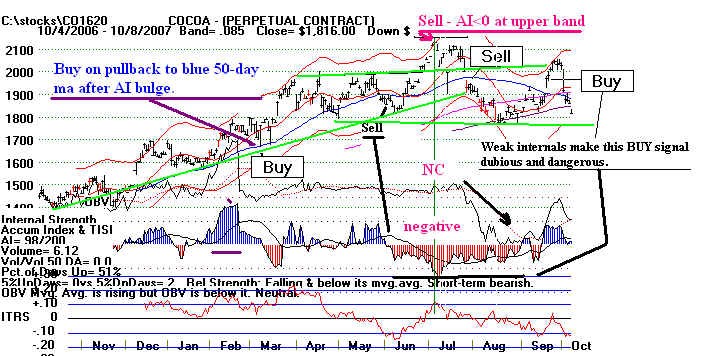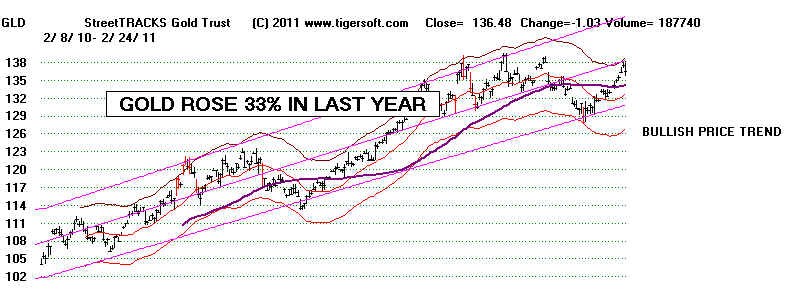Tiger Blog FALSE BREAKOUTS How to Recognize Them and Profit from Them
Post on: 23 Апрель, 2015 No Comment

How To Predict and Spot Them.
How To Profit from Them.
Traders will inevitably find themselves owning a stock that
a subsequent high. The danger of a 33% loss or more is quite high.
Savvy traders look for these patterns to short. They know the
breakout has already forced the more nervous short sellers to
cover. Without short sellers to cushion the decline, prices
can fall a long way.
False Breakouts above Flat Tops Are Obvious and Often Very Bearish.
PAAS had already doubled in 7 months. That made the March breakout late. 20 is often
a significant psychological price barrier. The negative (red) Tiger Accumulation Index showed that
BASIC TECHNICAL ANALYSIS
Good technical analysis requires a mastery of the concepts of support and resistance.
Inspecting charts, you will often see very traceable lines of support that go through a
series of lows made by the stock, index or commodity. Oppositely, a resistance line goes
through a series of highs. Some people use closing highs and lows to develop these
important lines. I have found intra-day highs and lows often make better lines, but it’s the
closings that must move past the line for a breakout or breakdown. The support level may
have to be tested many times before a rally ensues. But once the support is seen as reliable,
prices typically get bid up to the overhead resistance line, if present. Similarly we see prices
sag once it becomes clear that a stock, index or commodity cannot get past a resistance
point. In this case, prices usually fall back to the most reliable line, or, sometimes, zone of
support. The DJI chart of 1986 shows the importance of recognizing support and resistance.
At some point the support or resistance level is overcome. The company’s earnings picture
changes, new players come onto the scene, the Fed takes a different tact: all these and many
other pieces of news or developing stories can cause price breakouts or breakdowns. Prices
breakouts or price breakdowns usually bring a speedy move away from the previous trading
range or price hesitation pattern. After the breakout, prices are expected to move up or down,
at a minimum, the height of the previous trading range. Many times they move up much
further. And the breakout run are often very fast. This is why breakout playing is so popular.
Investors Daily has devoted whole segments of its newspaper to this concept. Breakout buying
has a long history of successes, but no where more so than in long bull markets. Read what
J esse Livermore and Nicholas Darvas wrote about this exciting way of trading.
Jesse Livermore noticed several things about stock market leaders in an up trending market. Their price
kept going up. That’s how you make money. He would look for industry groups that were leading the market
and trade only the leaders of that group. This made perfect sense. A leading industry group means only one
thing: there are more stocks going up than other groups. Not rocket science, but when you’re risking your
own money, you don’t want it to be. By trading only stocks in a leading industry group you can focus on that
small subset of stocks actually rising. He avoided weak stocks and their industry groups. The probabilities
were too great of losing money.
If Jesse found a stock he liked, he would decide in advance how many shares he’d buy. If he decided
to buy 400 shares of AAPL, he’d first purchase 100. If the price increased, he’d buy another 100; then finish with
a purchase of 200 shares if it kept rising. He needed confirmation that a stock would make him money. What
better way to confirm a stock price is going up…than if it’s going up.
Read the reviews of the books by Darvas on Amazon.
All New Highs Are Not Breakouts
New highs do not necessarily entail a Breakout past well-tested resistance. There are
many more new highs that there are breakouts past a horizontal line drawn through at least
3 previous highs. It is breakouts that we are most interested in. But Tiger’s internal strength
indicators validate new highs generally. MTH below made a new high, but had no flat well-
tested resistance that it moved above. So, it was not a breakout on 12/6 as we use that term.
Nevertheless, the falseness of its rally can be seen in:
1) OBV did not make a corresponding new high.
2) The Tiger Accumulation Index was less than half of what it was 2 months’ earlier.
3). The ITRS (Relative Strength) did not confirm the new high and was an insipid .-3
Authenticating Breakouts
Please see the discussion of this topic I began here on October 28, 2007.
TigerSoft and Peerless make much of breakouts and how to authenticate them, so that
we can buy the strongest of them and avoid the ones that fail. Breakouts and breakdowns
are most reliable when the stock moves in the direction of the overall market. Thus, a young

bull market with growing numbers of daily New Highs is very beneficial to the breakout Buyer.
An aging bull market, or one that is ending, shows many more false breakouts. In fact,
when you spot a number of false breakouts, you should immediately consider the likelihood
that a severe correction or a bear market may be beginning.
The best price breakouts are also usually confirmed by a surge of volume. Our Tiger
Charts show increases of volume by making the price bar red for that trading day. Price gaps
Accumulation Index was positive and did reach the levels of the old highs. The ITRS (Relative
Strength) definitely confirmed the breakout.
A true price breakout may still retreat without achieving its price objective. But the
best breakouts advance 10% to 30% very quickly and fulfill their minimum price objective,
sometimes in only a few days. In the chart above, I would take the previous trading range
to be 14 point high, 40-26. If we consider the price breakout to be 39, then the height
of the earlier pattern sets up a price objective of 39 + 14, or 53. SSRI still has more upside price
Broken Resistance Becomes Support. Note the breakout at 31 in July was confirmed by
all our key indicators. In August prices did pullback to the point of breakout. The retreat
quickly found support. The ITRS stayed very positive. The Accum. Index turned only
slightly negative. Soon prices burst upwards to a new high on (red) high) volume and moved
much higher. Any inspection of charts in a rising general market environment will produce
hundreds of examples of pullbacks to the support of earlier breakouts, just like this.
========= ABX Breaks our, Tests Point of Breakout and Rises Sharply. ===============
BREAKOUT FAILURES
Breakouts do sometimes fail. In these cases. prices move up a little and then
within a month or two, fall back below the point of breakout. This usually occurs
Traders Must Sell on A Clear Breakout Failure.
Very Aggressive Traders Should Even Sell Short.
The examples above show holding a stock that breaks out and then
quickly retreats back below the point of breakout on a closing basis by














